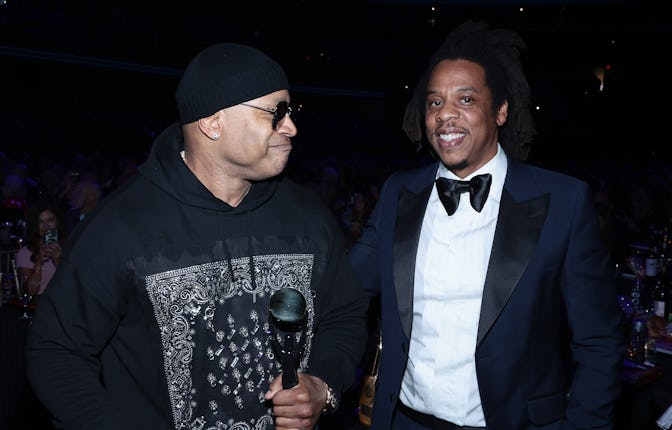Hip-Hop deserves a functioning hall of fame
Jay-Z and LL Cool J may be in the Rock and Roll HOF, but legends won't get their just due until hip-hop can enshrine its own.

Making history can often inspire people to make a change. Jay-Z and LL Cool J’s recent inductions into the Rock & Roll Hall of Fame are both historic examples of hip-hop’s expansive cultural reach, and reminders of why hip-hop needs a functioning hall of fame of its own.
The Rock & Roll Hall of Fame’s inclusion of hip-hop is relatively new, and has omitted dozens of legends from joining its ranks. There wasn’t a single hip-hop act in the Rock & Roll Hall of Fame until March 12, 2007, when hip-hop pioneers Grandmaster Flash & The Furious Five were inducted — 25 years after the group’s seminal track “The Message” widened hip-hop’s reach by becoming one of the genre’s first hits on the Billboard charts. It wouldn’t be for another decade until the Rock HOF inducted its first solo hip-hop artist, 2Pac, after inducting legendary groups inducting acts like the N.W.A., Public Enemy, and The Beastie Boys. LL Cool J was essentially the first hip-hop star, and his induction this year comes after being nominated six times since 2010. As of 2021, only nine hip-hop artists have been inducted; a number that disrespectfully misrepresents hip-hop’s influence on popular music for more than 45 years.
Often, conversations around white establishment’s blind spots prompt calls for Black people to build and exalt their own platforms instead. To that point, there is a hip-hop hall of fame — but it’s had obstacles on its road to sustainability. The Hip Hop Hall of Fame (HHHOF) was founded in 1992 by Army veteran James “JT” Thompson, and the first induction ceremony aired on BET in 1996, inducting Run DMC, DJ Kool Herc, Grandmaster Flash, and DJ Red Alert, along with a bevy of other hip-hop luminaries, according to the Hip Hop Hall of Fame Museum website. There wouldn’t be another televised Hip-Hop Hall of Fame induction ceremony until 2014, an 18-year gap which organizers have attributed to the competing popularity of The Source Awards and a decrease in mainstream media attention due to the deaths of Tupac Shakur and Notorious B.I.G., which took place within a year of the first televised induction ceremony.
More than any other factor, hip-hop’s hall of fame is largely forgotten about because there wasn’t a universal hall of fame for hip-hop for years. In 2002, publications touted an event held at New York’s Puck Building as the inaugural Hip-Hop Hall of Fame induction ceremony. Even with hip-hop icons like Slick Rick and Grandmaster Flash in attendance, Thompson claimed in 2010 the event was run by imposters improperly using the HHHOF moniker, which allegedly prompted BET to pull out of televising the event, according to a press release. Along with complications with the award show being co-opted by outside entities, the biggest impediment to the establishment of a hall of fame tradition for hip-hop has been the difficulty in bringing a museum to life.
Artists were getting inducted into the Rock & Roll Hall of Fame for nine years before the museum’s grand opening in 1995. Thompson sought to use the same business model, and make the HHHOF the primary manner of fundraising for the museum. The hall of fame ceremony is meant to honor the artists but also help create and sustain a museum designed to do the same. Over the last 15 years, Thompson’s efforts to erect a museum have been joined by endeavors from former Bronx City Councilman Larry Seabrook, hip-hop fan Craig Wilson, and co-founder of the ‘80s hip-hop label StrongCity Records Rocky Bucano, with their own plans to build museums of their own. After funding for Seabrook’s museum plans halted following his fraud conviction in 2010, Wilson’s National Hip Hop Museum appears to have been discontinued after its website was taken down and updates have stalled over most of the last decade.
While Thompson had a 23-year head start on Bucano and promises to have the Official Hip Hop Hall of Fame Museum & Hotel Retail Entertainment Complex open in Harlem in 2023, Bucano’s Universal Hip Hop Museum broke ground in the Bronx — hip-hop’s birthplace — earlier this year in May with Nas, LL Cool J, Grandmaster Flash and a group of the most influential hip-hop pioneers in attendance. Neither Thompson nor Bucano have announced any future plans for hall of fame inductions, leaving the Rock & Roll Hall of Fame as still the only institution regularly placing hip-hop artists among the pantheon of other great hip-hop artists, even if they’re largely surrounded by rock artists. But, that needs to change soon.
Artists are only eligible for the Rock & Roll Hall of Fame 25 years after their first recording. With only a few handfuls of hip-hop artists in the hall, that leaves artists like Nas, The Fugees, Eric B & Rakim, Snoop Dogg, Queen Latifah, MC Lyte, and dozens of other hip-hop artists that shaped the sound of music left out, even though they fit the criteria. Whether it’s a museum, a televised award show, or a combination of both, the most popular music genre of the last four years deserves to have its legends enshrined with each other, and not being fit into a hall of fame that originally never intended to include the genre in the first place.